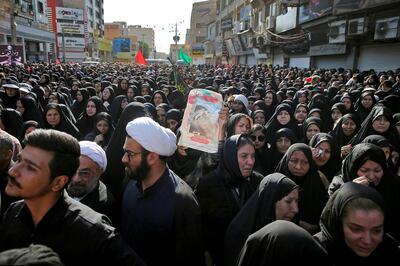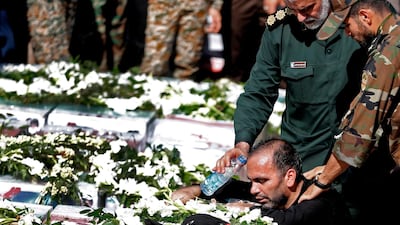A senior Iranian parliamentarian on Saturday slated the country's security personnel for failing to stop a mass shooting attack that killed 25 last week in the city of Ahvaz in Khuzestan province.
Heshmatollah Falahatpisheh said Iranian snipers tasked with protecting the event had not acted decisively and hesitated to intervene after being ordered to shoot, the semi-official news agency ISNA reported.
"There were eight or nine sharpshooters who could have killed the terrorists within 30 seconds...but one of them couldn't believe there was a terrorist attack and thought blanks were fired, and said he had received no order to shoot," Mr Falahatpisheh, head of parliament's national security committee, said.
"He fails to shoot even after being ordered," Mr Falahatpisheh said, describing the events as shown in the video which he said was produced by the army and the Intelligence Ministry.
Tehran had already accused an array of parties for perpetrating or having a hand in the attack.
There have been two claims of responsibility for the gun assault, including one by ISIS.
Here is what we know about the accusations and claims.
- Separatist movements -
Soon after the attack, the elite Islamic Revolutionary Guards Corps accused the Al Ahwaziya movement of culpability.
Al Ahwaziya is an Arab separatist movement from Khuzestan province - an Arab-majority province in south Iran on the border with Iraq - but it comprises various groups.
On Saturday, London-based opposition channel Iran International TV broadcast a claim of responsibility by a group called the Ahvaz National Resistance.
Two other regional separatist movements - the Ahwazi Democratic Popular Front and the Arab Struggle Movement for the Liberation of Ahvaz - made statements denying any involvement.

- The blame game -
President Hassan Rouhani on Sunday accused an unnamed Gulf country of giving financial, armed and political support to the instigators of the attack.
The same day, Iran's foreign ministry summoned the UAE's charge d'affaires over what it called "offensive remarks" by a political adviser. Abu Dhabi denied any link to the attack.
Iran has strained relations with the UAE, while diplomatic ties with Bahrain and regional rival Saudi Arabia have been broken since 2016.
On Saturday, Iran summoned diplomats from Denmark, the Netherlands and Britain, accusing these countries of hosting "terrorist group members" responsible for the attack.
In a statement on Sunday, the Revolutionary Guard pointed the finger of blame at a "Western-Hebrew-Arabic satanic triangle".
Foreign Minister Mohammad Javad Zarif said the attack was carried out by "terrorists recruited, trained, armed & paid by a foreign regime".
"Iran holds regional terror sponsors and their US masters accountable for such attacks," he wrote on Twitter.
Iran's supreme leader Ali Khamenei described the attack as the continuation of a "conspiracy by regional governments in the pay of the US".
- ISIS -
ISIS claimed its first attack in Iran on June 7, 2017, when gunmen and suicide bombers hit the parliament in Tehran and the shrine of revolutionary leader Ayatollah Ruhollah Khomeini, killing 17 people and wounding dozens.
On Wednesday, ISIS threatened to carry out new attacks in the Islamic republic.
Iran is "flimsier than a spider's web, and with God's help, what comes will be worse and more bitter", the group said in a statement on the Telegram messaging app.
In a video released in March 2017, the extremist group threatened to retaliate against Iran for its military and logistical support to the Syrian and Iraqi governments, as Damascus and Baghdad battled ISIS insurgencies.
The have said they want to conquer Iran to "return it to the Sunni Muslim nation" and to provoke a Shiite bloodbath.

